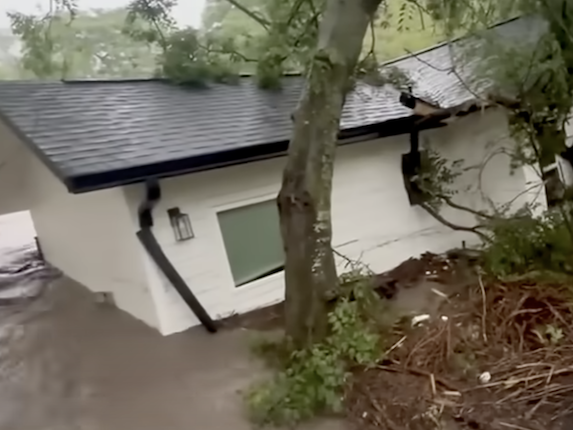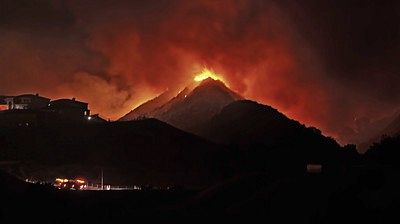As floods in Texas kill dozens, climate warnings are still being ignored while denial is turned into policy and profit for those in charge. Mark Beeson reports.
WE’VE HAD SO MANY wake-up calls about the state of the environment, it’s little wonder that many of us are permanently alarmed. Unfortunately, policy-making elites around the world seem to be immune to the warnings of experts or even the endless and intensifying weather events that punctuate our lives with increasing frequency.
The floods in Texas are an especially jarring example of the genre. Dozens of the victims in the growing death toll were young girls attending a Christian summer camp. No doubt this will be a stern test of their parents’ faith in a loving god. Let’s hope it inspires a general reassessment of more mundane reality, too, so that some good may come of an appalling but entirely foreseeable tragedy.
Climate scientists have been warning for decades about the possible consequences of global warming, not the least of which is ‘heavy precipitation’. As oceans heat and more moisture evaporates into the atmosphere, it produces more intense rainfall.
As America’s Environment Protection Agency (EPA) helpfully points out:
‘Nine of the top 10 years for extreme one-day precipitation events have occurred since 1995.’
I’m no climatologist, but I think there might be a bit of a pattern developing here. We might hope that policymakers in the U.S. would be indebted to the EPA for pointing this out. On the contrary, the EPA is one of the many government agencies that is being gutted by the Trump Administration, with plans to cut over 1500 scientists and slash the agency’s budget by 65 per cent.
This is, of course, part of a wider agenda of cuts targeting government agencies which are judged to be wasteful or not in keeping with the Trump Administration’s ideological agenda. The EPA’s principal faults are hindering a renewed enthusiasm for fossil fuel exploitation, and drawing attention to the impact of climate change on the natural environment and the dangers this may pose for American citizens.
If actions speak louder than words, the simultaneous plan to “phase out” the Federal Emergency Management Agency (FEMA) is an unambiguous expression of both President Donald Trump’s lack of empathy and understanding. Not only does he reject the warnings of the EPA, but he deliberately reduces the ability of the government to respond effectively to environmental disasters at times of crisis.
The Trump Administration, rather predictably, claims the failure to warn people about the danger had nothing to do with the President or his desire to eviscerate America’s state capacity. But it’s hardly a coincidence that the National Oceanic and Atmospheric Administration (NOAA), which operates the National Weather Service (NWS), has also been subject to budget cuts and the loss of experienced personnel. U.S. Homeland Security Secretary, Kristi Noem, insightfully noted that “weather is difficult to predict“, which might be one reason for employing people who can.
Clearly, no one in the Trump Administration is willing to join the dots between a warming planet and the rapidly increasing number of climate-induced catastrophes. And yet, not even the U.S., with all its wealth and power, can avoid the consequences of its outsize role in creating what is now an unprecedented global crisis.
The key question for those of us who know more about politics than climate science is whether Americans, in particular, are capable of making the connection between public policy, private preferences and the environmental catastrophe that is unfolding with increasing rapidity.
Unfortunately, the prospects are not good. Education levels are the best indicator of how Americans vote, and Trump supporters are victims of the startling inequality in educational opportunities that entrench social division and opportunity. It may not be Trump supporters’ fault that they are badly informed or susceptible to demagoguery, but the results are all too predictable.
President Trump is clearly not solely responsible for the environmental dangers and social inequalities that plague America. But he is in a position to do something about it, even if the something in question is likely to make things worse.
Paradoxically, the only hope of Trump responding to environmental reality’s unambiguous signals is that the impact on America becomes so intense that he has no choice other than to act or at least look as if he’s acting. The speed at which Texan-style catastrophes are increasing means that it could happen while he’s still in power, especially if he has a third term.
But even if the evidence of crisis and responsibility becomes incontrovertible, Trump may not be moved. He is, after all, someone who facilitates the continuing slaughter of thousands of children in Gaza, not least because it might open lucrative opportunities for property development.
But before we start feeling smug about our country, we should remember that we also continue to elect governments that exacerbate the climate crisis despite all we know about its inevitable, incontrovertible dangers.
When the whirlwind comes, it won’t all be Trump’s fault.
Mark Beeson is an adjunct professor at the University of Technology Sydney and Griffith University. He was previously Professor of International Politics at the University of Western Australia.
Support independent journalism Subscribe to IA.
Related Articles




